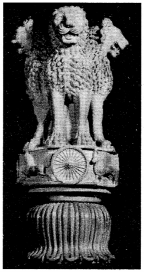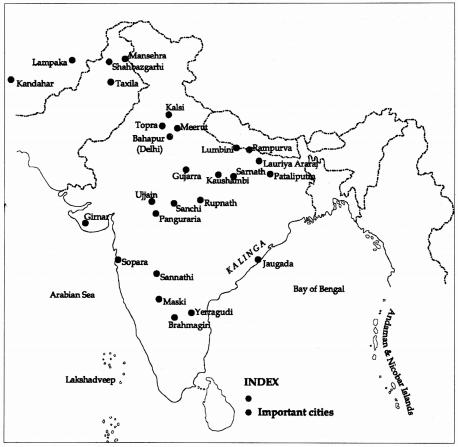If you’re looking for a way to enhance your Social Science, then look no further than the NCERT MCQ Questions for Class 6 History Chapter 8 Ashoka, The Emperor Who Gave Up War with Answers Pdf free download. MCQ Questions for Class 6 Social Science with Answers is perfect for those who are in class 6 History and want to get ahead of everyone else by mastering their subject skills as soon as possible!
Ashoka, The Emperor Who Gave Up War Class 6 MCQs Questions with Answers
Solving MCQ on Ashoka, The Emperor Who Gave Up War Class 6 with Answers can be of great help to students as they will be aware of all the concepts. These Class 6 History Chapter 8 MCQ with Answers pave for a quick revision, thereby helping you learn more about this subject.
Question 1.
As per Megasthenes, how many gates were in the Pataliputra?
(a) 20
(b) 35
(c) 55
(d) 64
Answer
Answer: (d) 64
Question 2.
Name of the bird which was included in the tree that was carried with emperor at the time of appearance in public:
(a) Trained Crows
(b) Trained sparrows
(c) Trained parrots
(d) Trained ducks
Answer
Answer: (c) Trained parrots
Question 3.
The duty of Dhamma Mahamatta was:
(a) Went place to place for teaching people about dhamma.
(b) To collect the taxes.
(c) To punish the people who violated rules.
(d) To award the people who are gentle.
Answer
Answer: (a) Went place to place for teaching people about dhamma.
Question 4.
A sculpture of polished stone bull which was found in Rampurwa (Bihar) is now placed:
(a) In Parliament House
(b) In front of the Share market office at Mumbai
(c) In Rashtrapati Bhawan
(d) In PMO office.
Answer
Answer: (c) In Rashtrapati Bhawan
Question 5.
Name of the Ashoka’s grandfather:
(a) Bindusara
(b) Chandragupta
(c) Chanakya
(d) Upgupta
Answer
Answer: (b) Chandragupta
Question 6.
Which city was the capital of the Mauryan Empire?
(a) Taxila
(b) Ujjain
(c) Samath
(d) Pataliputra
Answer
Answer: (d) Pataliputra
Question 7.
In the Mauryan Empire, taxes were collected from:
(a) Farmers, herders, crafts persons, traders
(b) Slaves, herders, crafts persons, traders
(c) Farmers, slaves, crafts persons, traders
(d) Farmers, herders, women, traders
Answer
Answer: (a) Farmers, herders, crafts persons, traders
Question 8.
Megasthenes was:
(a) A trader
(b) An ambassador
(c) King
(d) Chandragupta’s son
Answer
Answer: (b) An ambassador
Question 9.
Place where Ashokan Pillar is located
(a) Lamhi
(b) Sarnath
(c) Sikral
(d) Salarpur
Answer
Answer: (b) Sarnath
Question 10.
What is Arthashastra
(a) Place
(b) Book
(c) Palace
(d) Officials
Answer
Answer: (b) Book
Question 11.
Royal princes often went to the provinces as _____________
(a) Ministers
(b) Governors
(c) King
(d) Administrators
Answer
Answer: (b) Governors
Question 12.
Adviser of Chandragupta Maurya
(a) Buddha
(b) Tansen
(c) Kautilya
(d) Birbal
Answer
Answer: (c) Kautilya
Question 13.
The national emblem of India has been taken from the pillar at Sarnath which had
(a) Bear
(b) Tiger
(c) Lion
(d) Snake
Answer
Answer: (c) Lion
Question 14.
A state of an vast empire is known as
(a) District
(b) Capital
(c) Provinces
(d) Village
Answer
Answer: (c) Provinces
Question 15.
From whom did they collected taxes
(a) Hunters
(b) Farmers
(c) Craftsman
(d) All of these
Answer
Answer: (d) All of these
Question 16.
Item famous in the South
(a) Beans
(b) Millets
(c) Cereals
(d) Peppers
Answer
Answer: (d) Peppers
Question 17.
Item famous in the North-west
(a) Peppers
(b) Rice
(c) Blankets
(d) Gold
Answer
Answer: (c) Blankets
Question 18.
What is statecraft?
(a) An art of hunting in states
(b) An art of making pottery
(c) An art of running an provincial government or empire
(d) An art of making things in particular state
Answer
Answer: (c) An art of running an provincial government or empire
Write true (T) or false (F)
1. Megasthenes wrote about the Mauryan Empire what he saw. Find out which statement is true and which is false.
(a) Emperor was carried in gold palanquin.
Answer
Answer: True
(b) Guards rode elephants decorated with gold and silver.
Answer
Answer: True
(c) Some of guard carried trees on which lived birds.
Answer
Answer: True
(d) The king was normally surrounded by armed women.
Answer
Answer: True
(e) Pataliputra is a small city.
Answer
Answer: False/ big city
(f) It has 200 towers.
Answer
Answer: False / 570 towers
(g) The king’s palace was also covered with stone carving.
Answer
Answer: True
(h) The king had special servants to taste the food.
Answer
Answer: True
2. The statements, which are given below, are in regards to the Kalinga, find out true or false:
(a) Kalinga is the ancient name of coastal Orissa.
Answer
Answer: True
(b) Ashoka fought a war to conquer Kalinga.
Answer
Answer: True
(c) He was not horrified when he saw the violence and bloodshed.
Answer
Answer: False
(d) In the war more than 1.5 lakh people were captured.
Answer
Answer: True
(e) About 1 lakh people died in the war.
Answer
Answer: True
(f) Ashoka had observed dhamma before war.
Answer
Answer: False/after
(g) Ashoka had lost one arm in the war.
Answer
Answer: False
(h) He gave up Kalinga after winning the war.
Answer
Answer: True
Match the following
1.
| Column-I | Column-II |
| 1. Chanakya | (a) Seleucus Nicator |
| 2. Founder of Mauryan Empire | (b) Provincial capital |
| 3. Taxila or Ujjain | (c) Arthashastra |
| 4. Megasthenes | (d) Chandragupta |
Answer
Answer:
| Column-I | Column-II |
| 1. Chanakya | (c) Arthashastra |
| 2. Founder of Mauryan Empire | (d) Chandragupta |
| 3. Taxila or Ujjain | (b) Provincial capital |
| 4. Megasthenes | (a) Seleucus Nicator |
Fill in the blanks
1. About ……………………… years ago Mauryan Empire was founded.
Answer
Answer: 2300
2. ……………………… was the founder of Mauryan Empire.
Answer
Answer: Chandragupta Maurya
3. The name of book written by Chanakya is called ……………………… .
Answer
Answer: Arthashastra
4. Ashoka’s father’s name was ……………………… .
Answer
Answer: Bindusara
5. The area around ……………………… was under the direct control of the emperor.
Answer
Answer: Pataliputra
6. Taxila or Ujjain were the ……………………… capital.
Answer
Answer: provincial
7. North-west was important for blankets and south India for its ……………………… and ……………………… .
Answer
Answer: gold, precious stones
Picture Based Questions
1.

(a) Do you know what is this picture is called?
(b) From where is it taken?
(c) What is importance of this?
Answer
Answer:
(a) This is known as emblem
(b) This has been taken from a massive stone pillar situated at Sarnath near to the Varanasi, Uttar Pradesh. This is an upper part of stone wherein four lions are made.
(c) This is adopted as a national symbol. Government of India is using this as Logo. This symbol is used on stamp papers, letter heads of Members of Parliament, President and Vice President of India and many more dignitaries and on each Indian currency whether it is in form of papers or coins.
Map Skills
1. Find out following principal cities of Mauryan Empire on the Map.
(i) Pataliputra (ii) Ujjain (iii) Taxila
2. Find out following places where inscriptions were found
(i) Sarnath (ii) Sanchi (iii) Brahmagiri
Answer
Answer:

Hope you found this information on NCERT MCQ Questions for Class 6 History Chapter 8 Ashoka, The Emperor Who Gave Up War with Answers Pdf free download useful. We are always here to help, so if there is any specific query or question with CBSE Class 6 Social Science Ashoka, The Emperor Who Gave Up War Class 6 MCQs Multiple Choice Questions with Answers or any other topic please let us know in the comments below.